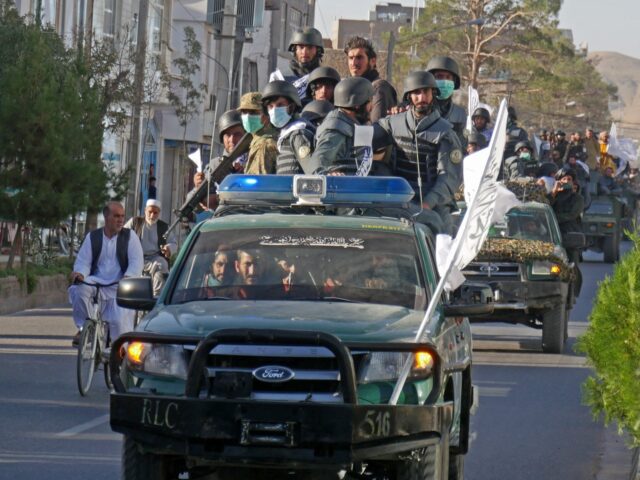The United States government revealed there was “an increased risk” Afghanistan terrorists or “terrorist-affiliated individuals” accidentally received $293 million in funding from the Department of State, a report details.
A report from the Special Inspector General for Afghanistan Reconstruction (SIGAR) revealed that two bureaus within the Department of State, the Bureau of Democracy, Human Rights, and Labor (DRL) and the Bureau of International Narcotics and Law Enforcement Affairs (INL) had not provided sufficient documentation to show if “their Afghanistan programs complied with State’s vetting guidance.”
DRL was missing “partner vetting documentation” for four of its awards, while INL was missing partner vetting documentation for 19 of its awards, according to the report. Due to this, the State Department was unable to “demonstrate compliance with its partner vetting requirements on awards that disbursed at least $293 million in Afghanistan.”
“According to State guidance, all bureaus are required to perform basic procedures and follow best practices during the pre-award phase, and to perform a risk assessment for each program,” according to the SIGAR report. “SIGAR requested and tested each bureau’s award listing documentation for Afghanistan programs.”
Other bureaus such as the Bureau of Political-Military Affairs, Office of Weapons Removal and Abatement (PM/WRA), the Bureau of Population, Refugees, and Migration (PRM), and the Bureau of South and Central Asian Affairs, Office of Press and Public Diplomacy (SCA/PPD) had provided sufficient documentation “showing they complied with” the State Department’s “vetting policies,” according to the report.
“According to State guidance, all bureaus are required to perform basic procedures and follow best practices during the pre-award phase, and to perform a risk assessment for each program,” the report explained.
The PRM, PM/WRA, and SCA/PPD were reported to have “completed bureau-prepared risk assessments for all of their awards in the audit’s scope,” along with Risk Analysis Management (RAM) “vetting documentation for eligible awards.”
DRL and INL, on the other hand, were reportedly unable to “demonstrate that they complied with” the State Department’s “partner vetting requirements for many of their programs in Afghanistan”:
DRL and INL could not demonstrate that they complied with State’s partner vetting requirements for many of their programs in Afghanistan. Specifically, DRL could only provide supporting vetting documentation for three of its seven awards, while the partner vetting documentation for four of its awards were missing from its contracting files. As a result, SIGAR could not determine whether DRL complied with State’s partner vetting requirements for four of its awards. Similarly, INL could only provide SIGAR with supporting vetting documentation for 3 of its 22 awards because supporting documentation for 19 of its awards was missing from its contracting files. Based on this response, SIGAR determined that INL did not comply with federal document retention requirements.
“In total, State could not demonstrate compliance with its partner vetting requirements on awards that disbursed at least $293 million in Afghanistan,” the report added. “State officials acknowledged that not all bureaus complied with document retention requirements. State officials told us that INL did not retain documentation because of employee turnover and the dissolution of its Afghanistan-Pakistan office.”
The report continued to praise PM/WRA, PRM, and SCA/PPD for helping to “prevent the diversion of U.S. taxpayer funds to the Taliban and its affiliates,” while admitting that because DRL and INL had not provided sufficient documentation showing “their compliance” with the Department of State’s vetting requirements, there was “an increased risk that terrorist and terrorist-affiliated individuals and entities may have illegally benefited from State spending in Afghanistan.”
“As State continues to spend U.S. taxpayer funds on programs intended to benefit the Afghan people, it is critical that State knows who is actually benefitting from this assistance in order to prevent the aid from being diverted to the Taliban or other sanctioned parties, and to enable policymakers and other oversight authorities to better scrutinize the risks posed by State’s spending,” the report added.
In response to the report, Mara Macie, who is seeking to unseat incumbent Rep. John Rutherford (R-FL), Macie questioned why he did not “stop our tax dollars from flowing to the Taliban,” pointing out that he sits on the House Appropriations Committee.
“This shocking new Inspector General report shows hundreds of millions of US tax dollars went to the Taliban even after the horrific Biden/Kamala Afghanistan withdrawal, that killed 13 of our servicemembers,” Macie wrote in a post on X. “Hey @RepRutherfordFL, since you sit on the Appropriations Committee, why didn’t you stop our tax dollars from flowing to the Taliban? Isn’t that part of your job?”

COMMENTS
Please let us know if you're having issues with commenting.